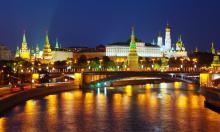1991-2000: “Russia Bearing its Cross”
This year, the Russky Dom (Russian House) publishing house published a book entitled “Russia Bearing its Cross. 1991-2000” by Nikolai Leonov. “The book is about 10 years of betrayal and disgrace of Russia, of meanness, and obscurantism,” – Nikolai Leonov says about his work.
The author is a lieutenant-general and Doctor of Historical Science, who worked for Soviet and Russian intelligence for 33 years (12 of them – as the chief of the information-analytical office). In 1984-1991, Nikolai Leonov was deputy chief of the intelligence service, responsible for work America. In 1991, he sent in his resignation. The subject of Nikolai Leonov’s book is Yeltsin’s period in the life of Russia, which added to Russian history an exclusively black color. The author considers the main events of that epoch, which were turning-points for that tragic time, when many people, patriots who no longer believed in the Russian nation, seriously spoke about Russia in the past tense: Russia, “we have lost.” That was in August of 1991, the “putsch” (inverted commas of Nikolai Leonov), the Belovezhsk Agreement, the predatory privatization, and the shooting of the House of Soviets in October, 1993. The full dictatorship of Yeltsin’s “family.” The first Chechen campaign, which was the defeat of the Federal Forces because of the leadership’s betrayal. “Russia paid a high price for Yeltsin’s military and political straying into the Chechen jungles, - Leonov writes about the Chechen war. More than 350,000 Russians had to escape the republic in which they were born and grew up. Those who remained there and could not leave the republic paid for this mainly with their own lives. Only after the Khasavurt agreement and before the second Chechen war, 21 Russians were killed in the republic, according to the Ministry of Nationalities. Russians were deprived of 100,000 houses and flats, and the whole of their cattle was seized. Fifty-thousand people were put into bandage; almost a half of them worked on the building of a highway through gorges to Georgia. All Orthodox churches were destroyed in Chechnya, while priests were kidnapped or killed by the militants. The bandits did not spare their countrymen who were loyal to Russia. More than 5,000 Chechens were killed, suspected of sympathy to Russians. A submachine burst of fire was the most humane execution, while most of people were knifed in the most cruel way. Some witnesses say that they have seen people throwing into burning lime, the sawing off of heads with a handsaw, the breaching of heads with hammers, etc. In Dudaev-Maskhadov, Chechnya, a regime was established that has only one forerunner: the bloody dictatorship of Pol Pot in Cambodia.”
The 1996 presidential election, where Yeltsin won again. The financial collapse of August 17, 1998. The start of the collapse of the Yeltshin regime. The impeachment of Yeltsin and the second Chechen campaign. Then, the “Rise of Putin’s Star” (this is the title of the book’s last chapter. One of the merits of Leonov’s publicism is that the author is not an “impartial researcher,” but he passes all the events through himself, because he was an eye-witness to them, and sometimes even a participant. This could be seen even in the style of writing: there is no cold, official narration supported with statistics, but all “i’s” are dotted, all betrayers are stigmatized, and real heroes are named, while the compass of the research is the author’s love of his motherland.
The book starts with memories of the events of the May 7, 2000 ceremony of Putin’s inauguration, at which Boris Yeltsin attended already with prefix “ex.” And what is the result of the ten years and the further development of Russia that experienced the “shock therapy” of Yeltsin’s period, according to Nikolai Leonov?
In the last chapter, Nikolai Leonov quotes the book "The Godfather of the Kremlin" by Pavel Khlebnikov, a US citizen of Russia extraction, who devoted many years to the unmasking of Boris Berezovsky, this symbolic figure of Yetlsin’s time: “Will the catastrophe of Yeltsin’s era have a fatal result? It depends on if the country will manage to awake in time, if the young generation will hear the call of their forefathers, if women will devote themselves to large and healthy families, if the government will be able to give up its own interests for its duty, and if civil consciousness will awake in businessmen.” Further Leonov writes: “Every time I was asked about it, I sighed and said that, as a professional analyst, I could not see today, at the beginning of the century, enough reasons to forecast Russia’s revival, though, as a son of this land and of this nation, I could not resign myself with cold conclusions of the mind. With all my heart loving Russia, I believe that it will rise. I know from our history how important the person is at who is at the head of the state, and I will pray for God to put a person to the power’s helm who is worthy of this great mission.”
Sergei Stefanov PRAVDA.Ru
Translated by Vera Solovieva
Read the original in Russian: https://www.pravda.ru/main/2002/04/09/39478.html
Subscribe to Pravda.Ru Telegram channel, Facebook, RSS!




